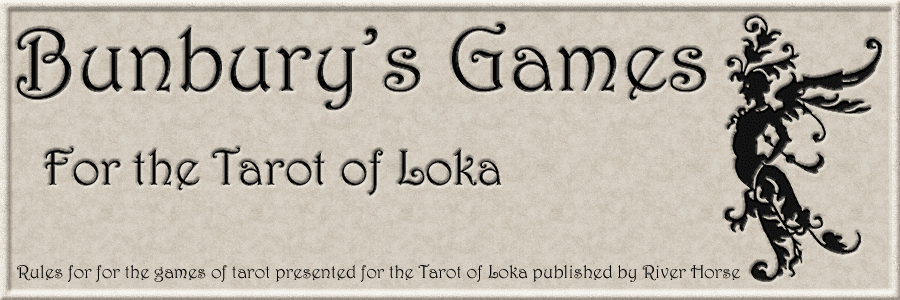Yikes! Errors in the scores...
I've begun the first round of error checking and have realised that in simplifying the method of counting card points, I've managed to make some mistakes. I'm working through them now.
Getting things started...
This little blog is an unofficial support site for a pack of playing cards called The Tarot of Loka, which is published by a UK games design company called River Horse. You can read more about it in the Introduction page.
The project is really an off shoot of another, larger project, also relating the games of tarot. I've put that on hold to focus on this, as I'm a little late to the game, as it were, having only discovered these cards nearly a year after their publication!
Before turning to the games, I really do recommend that you first buy a pack of Loca tarot cards (available on Amazon in both the UK for about £10, and the US for about $20), and then read the introduction material here. I'm posting the games with backdated publication dates so that they read in the order I would recommend you try them with all blog (as opposed to game) posts appearing as you would expect.
I have only made a start and I plan to add plenty more but for now, there should be enough to keep you occupied until I can find a little more time to work on this.
This is a simple game for four players in fixed partnerships, with
partners seated opposite each other, and is another good starting
point for new players. As above, you should not underestimate the
game because of its simplicity.
Strictly speaking, Tarocchi is the general name for Tarot games in
Italy but as all the others I’m listing have their own names and
‘Tarocchi for four as played in Piedmont’ is a bit long-winded,
we’ll grant it the name. It is well deserved though, as this is a
classic game and along with Scarto it is the basis for some of our
original games listed afterwards.
A game for four played in partnerships that is ideal for friends
whose game play is hopelessly informal. Partners are seated next to
one another rather than opposite and they are allowed to discuss
their cards and strategy between them. Sadly, this game died out long
ago in Europe but thanks for Historians we can rediscover it and
renew it by adding one or two little twists of our own.
In France this is simply Jeu de Tarot, which just means The
Game of Tarot. Well, there may just be the one game in France but
this book is full of games of tarot and so I’ve chosen an archaic
French spelling with a nice Gallic note to distinguish it. The basic
game is for four players but there are variants for three, five, and
six players that I shall give at the end. This is possibly the most
widely played tarot game and I have known players as far a field as
Spain to Ukraine – this alone makes it worth adding to your gaming
repertoire but it is also a very good game in its own right and I
particularly recommend the five player version as one of the best and
most fun games I have ever played.
In France there is a nationwide Tarot Federation that oversees
‘official’ rules – but really, those are just the rules
official to it and the tournaments organised for its members.
In fact there is a great deal of ‘unofficial’ variation in how
this is played and as according to Bunbury is no more according to a
Federation than it is to Hoyle – the rules given here are the ones
found most fun according to Bunbury.
Subscribe to:
Posts (Atom)





